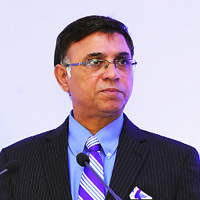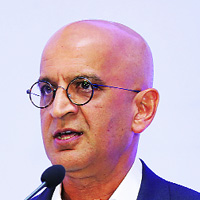OPPI organises conference on future of supply chain management in Mumbai

Key stakeholders of the pharma industry congregated at the event to confer and converse on the blueprint to build an effective and efficient supply chain ecosystem for the life sciences industry and drive continuous improvements in its management
OPPI recently organised a day-long conference in Mumbai for the stakeholders of the life sciences industry on the theme, ‘Future of Supply Chain Management.’ It aimed to showcase the importance of effective supply chain management in an age of biologics, gene therapies and personalised medicine which mandates products to be shipped in temperature-controlled conditions within tight timelines.

A Vaidheesh, President, OPPI and VP, South Asia & MD India, GlaxoSmithKline Pharmaceuticals commenced the event with his welcome address. He highlighted that healthcare needs are changing with time and as a result, the challenges too are unprecedented. He said, “Global best practices ensure that the quality of medicine is not compromised for the Indian patient. Today, healthcare is about longevity of life along with good quality of life. And, one important aspect to enable this would be a responsive and efficient supply chain system. We need a supply chain which ensures that patients receive the right medicines of optimum quality at the right time. Quality of medicines should not be compromised because of challenges in last-mile delivery.”
Next, Dr Sanjit Singh Lamba, MD, Eisai Pharmaceuticals India, drew attention to the fact that India Pharma Inc has lofty ambitions and intends to touch $50 billion by next year. But, it is also at crossroads and needs to rethink its strategies and revamp its systems for continued progress. Emphasising that revamping our supply chain and reducing its complexities is imperative to improve our pharma ecosystem, he opined that there is an urgent need to harmonise standards and services within the supply chain system to facilitate better efficiency and efficacy. Decongesting road pathways and leveraging the potential of rail and water pathways was also one of his recommendations.

MD, Eisai Pharmaceuticals India
The subsequent speaker, Dr YK Gupta, Principal Advisor (Projects), THSTI, took the stage to inform about the significance of drafting policies which will improve our supply chain management. He also said, “We need to make them ready from the academic level itself. Education in good supply chain practices should be given to all stakeholders at all levels in the pharma industry.”
Representatives from the regulatory authorities, Dr Rubina Bose, Deputy Drugs Controller (India), CDSCO West Zone, Ministry of Health and Family Welfare and Pallavi Dharade, Commissioner Food & Drugs Administration, Commissioner of Food Safety, Maharashtra State also addressed the audience at the conference.

Dr Bose spoke on the pivotal role played by supply chains in ensuring regulatory compliance, dealing with spurious suppliers and ensuring optimum quality. She also rooted for increased collaboration between regulators and industry to optimise the potential of supply chains. Dharade, on the other hand, underscored the importance of good distribution practices and product security while elaborating on the role played by technology in achieving these objectives. She said that tech-driven innovations are revolutionising supply chain systems with better adeptness and far-reaching impact. She also spoke on the measures taken by food regulators to improve quality and urged each stakeholder to do their best towards driving continuous improvements in supply chain management.

Dhaval Buch, Former Chief Procurement Officer, Unilever took the audience through the evolution of supply chain system 1.0 to supply chain system 4.0. He spoke on how priorities have changed and highlighted that the pace of transformation has become very rapid. He informed, while 1.0 to 2.0 took 50 years, the change from 3.0 to 4.0 will leapfrog. He stressed that now transformation will also be driven by predictive demand and therefore all the providers in the supply chain need to be more proactive and get future-ready.
Representing the fourth estate, Viveka Roychowdhury, Editor, Express Healthcare & Express Pharma, accentuated that a patient-centric supply chain is the need of the hour. Elaborating on the urgent measures needed to make it a reality, she stated that pharma companies should break down silos between functions to build an integrated and collaborative supply chain system. She also cautioned pharma companies to strengthen their links and iron out all chinks in their supply chain systems carefully since their products will only be as secure as their weakest link.

Sudarshan Jain, Director General, Indian Pharmaceutical Alliance (IPA) also spoke on patient-centricity in supply chains and said, “The future of pharma supply chain will need to ensure that medicines delivered to patient retain effectiveness. Tech-enabled supply chain will not only increase the efficiency and quality of medicines dispensed but will also encourage patient-centred care.”
Experts also commented on the importance of preserving integrity in supply chains and how technology is facilitating this. Kanchana TK, Director General, OPPI said, “Making medicines is a series of complex processes involving manufacturing, supply chain, intermediaries and markets. Ensuring the integrity of the supply chain till it reaches the patient is critical. The future of the pharma supply chain will only get more advanced with the advent of technology and its interface.”

Daara Patel, Secretary General, Indian Drug Manufacturers Association (IDMA) was just as emphatic on the importance of supply chain integrity. He said, “We have several thousand manufacturers involved in making medicines. Making sure that they all adhere to global manufacturing practices is important to patient safety.” The event also witnessed interesting panel discussions revolving around pertinent issues about supply chains. In the first two panel discussions, experts and veterans from the industry discussed and deliberated on topics such as good distribution practices (GDP) and product security and the readiness of logistics and warehousing in India to support their implementation.
Nitin Soundale, Partner, PwC; Mohan Bhandari, MD, Bilcare; Dr Rustom Mody,
Sr Vice President and Head R&D, Lupin (Biotechnology Division); Manoj Lekhrajani, CMD, Pharmapoint Group of Companies; Aninda Shome, Director, India Cluster & Indo China, Global Supply Chain Lead, Pfizer India; Javin Bhinde, Director and Co-Founder, SynCore Consulting, Dr Rubina Bose, Deputy Drugs Controller (India), CDSCO West Zone, MoH&FW; Manjunath MS, Cold Chain Innovation Specialist, Global Cold Chain Alliance & Advisor, Cold Box; Rahul Agarwal, MD, Kool-ex Cold Chain; Krishnakant Parab, Senior Director – Supply Chain, Sanofi India; Mehul Shah, CEO, Logos India were the participants in these two discussions.

Editor, Express Pharma & Express Healthcare
These discussion focussed on several aspects of good distributions practices and on the various measures to enable their implementation. The panellists spoke on the impact of technology and its immense potential to improve GDP from warehousing to distribution. They recommended the industry to adopt more eco-friendly and pay utmost importance to the safety of the products and the people involved. They also said that training is key to improving warehousing and supply chain strategies. Skill building, creating an attitude which is pro-safety are very important. The experts also expressed hope that in the next five years, pharma supply chains will transform significantly in terms of better compliance, better standardisation, improved operations, better patient convenience, systems optimisation etc.

The third discussion was on ‘Business Practices for enduring and sustainable performance’ and comprised eminent panellists such as Ameesh Masurekar, Director, AIOCD Pharmasofttech AWACS; Sudarshan Jain, Secretary General, IPA; Daara B Patel, Secretary General, IDMA; Jagannath S Shinde, President, AIOCD and Darshan Patel, Partner, PwC. They underscored the importance of putting the patient at the centre of healthcare delivery and medicine. They also discussed strategies to meet global standards in supply chain management to ensure safe, efficacious and quality medicines to people who need them, when they need them. The panellists also shared learnings and from their experiences and stressed that more government support, improved technology adoption, infrastructure building, significant investment etc. would be essential to build a really good supply chain.

The fourth panel, under the topic, ‘Decoding applications of AI ML and Blockchain in Pharmaceuticals’ reflected and pondered on Ayushman Bharat and its impact, building a digitally-led pharma ecosystem, data security, role of robotics in tackling counterfeiting, and a lot more. The experts also explained, with the help of case studies and examples from international examples, how artificial intelligence and blockchain technology ensure that supply chains operate with 100 per cent precision. They also urged the pharma industry to become more digitally savvy and leverage their huge potential to leapfrog towards further progress.

Amit Mookim, MD, IQVIA; Ravi Chandrasekaran, Practice Partner – Blockchain at Wipro Technologies; S Sridhar, Managing Director, Pfizer India; and Sanjay Mehta, Principal, Mehta Ventures were the panellists for this discussion. Thus, the day-long event saw a lot of knowledge sharing and was very well received by the audience. Express Pharma was the media partner for this event.
(Collated by Lakshmipriya Nair)
EP News Bureau

